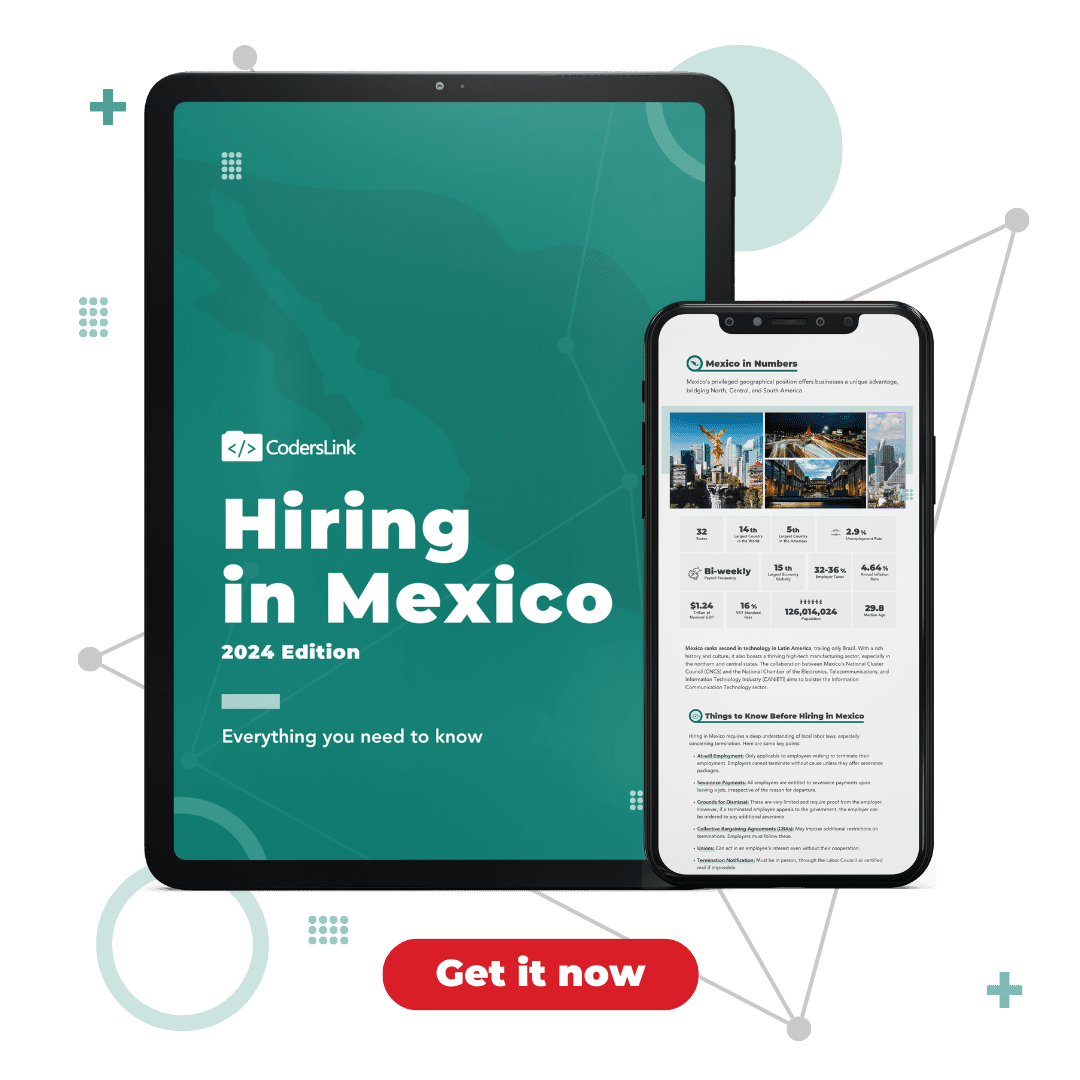
Due to the tech industry’s worldwide growth, numerous companies are looking for exceptional talent beyond the usual hiring locations. Latin America is currently recognized as a leading area for locating skilled tech professionals, offering various chances for companies with unique hiring setups. We will give you a comparison of hiring practices across key Latin American countries and the United States, helping you to refine your hiring strategies.
We will also offer strategic advice on work cultures, and legal considerations in five major Latin American countries—Mexico, Colombia, Argentina, Costa Rica, and Brazil—in comparison to the United States. Tech companies can use their understanding of these factors to make informed decisions on expanding their teams by nearshoring in Latin America.
Understanding Hiring Practices in Mexico, Colombia, Argentina, Costa Rica, and Brazil
A range of economic and social factors shapes the job market in Latin America, influencing the hiring journey in Mexico and the hiring practices in Colombia, Argentina, Costa Rica, and Brazil.
Overview of Hiring Practices in Each Country
Hiring practices in Latin America vary significantly from those in the United States, especially in the tech sector. Understanding the hiring practices in Colombia, hiring practices in Argentina, hiring practices in Costa Rica, and hiring practices in Brazil is key for companies aiming to recruit top talent. Here’s a snapshot of hiring practices in each of the key countries:
- Mexico: Tech industry in Mexico is expanding in its urban areas such as Guadalajara and Mexico City. Usually, the hiring procedure, often referred to as the hiring journey in Mexico, includes several interviews, technical evaluations, and an emphasis on fitting into the company culture. Additionally, the Mexican government plays a role in regulating labor laws, which can impact the hiring process.
- Colombia: The tech industry is mainly found around cities such as Bogotá and Medellín. Hiring in Colombia frequently includes utilizing online job websites, LinkedIn, and recommendations. The nation places a significant focus on technical abilities and past experience during the recruitment process.
- Argentina: Argentina is known for its strong education system and technical expertise, especially in the capital city of Buenos Aires. The hiring process in the USA is comparable, prioritizing candidates with robust problem-solving skills and adaptability. Recruitment firms and industry networks are key for finding potential candidates.
- Costa Rica: Costa Rica is recognized for its political stability and robust educational system, with a thriving tech industry concentrated in San José. Frequently, the recruitment process here includes working together with universities, job fairs, and online platforms. Costa Rican businesses highly prioritize bilingualism and technical skills.
- Brazil: It has one of the biggest tech scenes in Latin America, mainly situated in São Paulo and Rio de Janeiro. Hiring process in Brazil usually consists of detailed interviews and cultural compatibility. Many companies depend on a mix of online job boards, recruitment agencies, and networking for hiring.
Key Differences and Similarities
While these nations have some commonalities, like a rising focus on technical abilities and the utilization of online platforms for hiring, there are important distinctions to take into account. Mexico and Brazil have well-developed tech hubs and plenty of experienced professionals, whereas Costa Rica and Colombia are emerging markets focused on expanding their talent pool. Comprehending these subtleties can enable tech firms to customize their hiring approaches for every market.
Comparing Work Cultures: Latin America vs. America
Work environments in Latin America prioritize personal connections, loyalty, and hierarchy respect. English proficiency is increasingly valued in these regions, especially for roles that require communication with international teams. On the other hand, the U.S. culture values independence and achievement, focusing on efficiency and promoting based on merit.
Latin American workplaces prioritize social connections and in-person interactions, whereas American companies prefer decentralized decision-making and direct communication. Understanding these variances is crucial for efficiently leading international teams, promoting seamless cooperation and cohesion across cultural barriers.
Work Culture in Mexico vs. America
In Mexico, the work culture is known for its focus on relationships and hierarchy. Mexican workers prioritize personal relationships and may favor in-person communication over electronic methods like email or messaging applications. This is in contrast to the straightforward and goal-focused approach that is typically seen in American work culture. Having knowledge of these cultural differences is essential in order to efficiently oversee remote teams and guarantee seamless cooperation.
Work Culture in Brazil vs. America
The Brazilian work culture is recognized for being flexible and informal. Workers in Brazil tend to focus on achieving a balance between work and personal life and may have a more laid-back attitude towards meeting deadlines.
On the other hand, American work culture is usually more organized and focused on meeting deadlines. Tech companies may need to embrace a more flexible work atmosphere and encourage innovative problem-solving methods to fit in with Brazil’s work culture.
Work Culture in Colombia vs. America
Colombian work culture gives high importance to working together as a team and collaboration. Workers appreciate inclusiveness and frequently consult with coworkers before reaching decisions.
This differs from the more independent approach observed in the US, where workers might take more independent actions. Tech companies collaborating with Colombian teams should give importance to transparent communication and group decision-making procedures.
Work Culture in Argentina vs. America
In Argentina, a strong emphasis on creativity and flexibility defines the work culture. Argentine workers are commonly viewed as creative and inventive, traits that are well-suited for the rapidly changing tech sector.
Nonetheless, variations in working hours and expectations regarding accessibility may exist in comparison to the United States, where there is a greater focus on following a set work timetable.
Work Culture in Costa Rica vs. America
Costa Rican work culture prioritizes harmony and respect. Workers in Costa Rica appreciate a constructive workplace atmosphere and might steer clear of confronting others directly. On the other hand, American work environment tends to be more assertive, promoting a culture where staff are frequently urged to express their views freely. Comprehending these cultural distinctions can assist tech companies in generating a supportive and cooperative work atmosphere that is in line with Costa Rican values.
Strategies for Finding IT Talent in Mexico and Beyond
How to Hire Nearshore Software Developers in Mexico
Employing software developers from Mexico comes with benefits like being close to the US, sharing similar time zones, and having access to a growing pool of skilled professionals. Companies can also consider staff augmentation as a strategic approach to expanding their teams in Mexico and other Latin American countries.
Businesses can begin by collaborating with specialized local recruitment agencies for tech talent or using online platforms such as LinkedIn and local job boards. Another successful approach is to engage with the local tech community through involvement in hackathons, tech meetups, and partnerships with universities.
Leveraging Local Job Boards, Recruitment Agencies, and Tech Communities
Every Latin American country boasts its own array of popular job websites and staffing firms. In Mexico, platforms such as OCC Mundial and Computrabajo are commonly utilized, whereas in Brazil, Catho and Vagas.com are well known.
It is important to interact with local tech communities, as they can offer helpful recommendations and information about the local talent available. Developing connections with universities and tech companies can enable companies to connect with a pool of enthusiastic young professionals looking to enter the tech field.
Navigating Legal and Logistical Challenges
Comparing American Labor Laws with Mexico
The labor laws in Mexico, directed by the Mexican government, vary greatly from those in the US, particularly when it comes to hiring employees in Mexico. Companies must also be aware of the differences when hiring employees in Colombia and other Latin American countries to ensure compliance.
For example, in Mexican labor law, it is required that employees are given a Christmas bonus (Aguinaldo), profit sharing, and severance pay for termination. Moreover, in Mexico, employers permit a maximum of 48 hours in a workweek, and they compensate any additional hours worked at twice the normal pay rate. It is essential for companies to comprehend these legal distinctions in order to adhere to regulations and prevent legal conflicts.
Legal Considerations for Hiring in Mexico and Other Latin American Countries
Every Latin American country, apart from Mexico, has distinct labor laws and regulations that businesses must comply with. In Brazil, authorities carefully monitor employment agreements to provide workers strong protection from unfair dismissal.
In Argentina, there are stringent rules that control the labor market, such as regulations on contract varieties and termination processes. Businesses must consider the tax implications of hiring workers in these countries, including social security contributions and income tax obligations.
Success Stories and Case Studies
Examples of Tech Companies Successfully Hiring Remote Teams in Latin America
Multiple technology companies have effectively grown their teams in Latin America by utilizing the abundant tech talent and economic benefits of the region. These companies often leverage staff augmentation strategies and focus on hiring software developers with strong English proficiency to ensure smooth collaboration with global teams.
For instance, IBM and Intel have built extensive facilities in nations such as Mexico and Costa Rica, taking advantage of the proficient labor force and advantageous business conditions. These businesses have successfully incorporated remote teams into their worldwide operations, resulting in increased productivity and innovation.
Key Takeaways and Lessons Learned
The importance of comprehending local cultures, legal frameworks, and recruitment strategies is emphasized in the success stories of these companies. One important lesson is the importance of forming strong connections with local partners, like recruitment agencies and tech businesses. Another important aspect is the requirement of being flexible when overseeing remote teams, especially when it comes to adjusting to various work cultures and communication methods.
Practical Steps for Building and Managing Remote Teams
Best Practices for Integrating Remote Employees
Careful planning and execution are necessary to integrate remote employees into a global team. Setting clear expectations, offering thorough onboarding programs, and promoting inclusivity through frequent communication and team-building activities are key components of best practices. Establishing a strong feedback system is pivotal for addressing problems and achieving ongoing enhancement.
Tools and Technologies for Effective Remote Collaboration
For companies to successfully manage remote teams, they must invest in the right tools and technologies. Applications such as Slack, Zoom, and Asana simplify communication, project management, and collaboration with individuals across different time zones. Moreover, companies must consider employing tools such as Google Workspace or Microsoft Teams to ensure that remote employees can collaborate efficiently in real-time.
Conclusion and Next Steps
Recap of Key Points
Recruiting in Latin America presents tech firms with a special chance to access a growing number of qualified workers. By understanding the hiring practices in Colombia, Argentina, Costa Rica, and Brazil, along with the hiring journey in Mexico, companies can craft effective hiring strategies that align with local regulations and cultural nuances. By gaining insight into the hiring processes, work environments, and legal aspects in nations such as Mexico, Colombia, Argentina, Costa Rica, and Brazil, businesses can create successful tactics for establishing and overseeing distant teams.
Bottom Line
Tech companies looking to expand their teams in Latin America have a unique opportunity to tap into a growing pool of skilled professionals, but success hinges on understanding the region’s distinct hiring practices and work cultures. Don’t navigate this complex landscape alone.
Partner with CodersLink to streamline your hiring journey in Mexico and across Latin America. With our deep expertise in local markets, we’ll help you master the hiring practices in Colombia, Argentina, Costa Rica, Brazil, and more. Whether you’re interested in staff augmentation, building a remote team, or hiring top-tier software developers, we’ve got the tools and strategies you need.
Ready to make your next hire? Get in touch with CodersLink today for tailored consulting services, or download our in-depth hiring guides to kickstart your recruitment strategy. Let us help you find the right talent and build a team that drives innovation and success in your organization.


